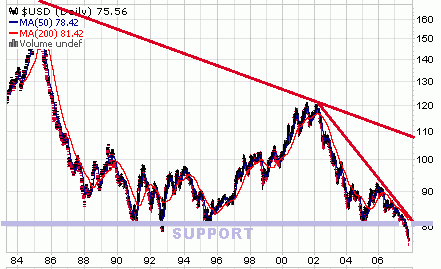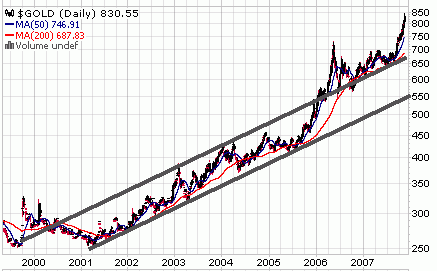|
Keep the Sinking Dollar from Stinking Up Your Bottom Line
The continuously sinking dollar constitutes an unusual form of currency risk for American small business owners. This is true to such a degree that the investment term “currency risk” will soon have a new definition. The old one was “The risk that a business' operations or an investment's value will be affected by changes in exchange rates.” (InvestorWords.com). The new one is simply : “Beware of the dollar!” The notion that the very reason you are in business (to earn as many dollars as possible in doing what you do) could somehow have become a drawback rather than an undisputed benefit surely must seem strange to every entrepreneur. It’s easy to get over that initial impression,however, by simply firing up some charting software and seeing for yourself what the deal is. Go take a look right now. That’s only the short term view, however. The long term view is even more likely to give you nervous twitches. You can see it right here:
The chart above shows that the dollar index has recently broken below the 80 point level without bouncing back. That has never happened before since the index was first compiled. It means that there is no way of even guessing how far the dollar will still have to fall before it eventually bottoms out. What Does It All Mean?Imports (on which we as a nation have become super-dependent, especially on the super-cheap ones from China, etc.) will start getting more and more expensive - and I’m obviously not just talking about oil. That will drive up prices here at home, especially raw material prices for things to be manufactured. At the same time, the US Fed is cutting interest rates, but rather than alleviating the problem, it adds to it. While up until the recent past Fed rate cuts were always seen as “good” for the economy (lower interest rates make borrowing and therefore business expansion cheaper and allow consumers to spend more, raising business profitability), they now cause the dollar to lose even more traction internationally. Concurrently, the ongoing credit crisis that has led to humongous profit and credit write-downs of the world’s largest financial institutions (like, say, Citigroup and Merrill Lynch), and that will make business loans harder to get and more expensive, the Fed rate cuts notwithstanding. Since making money is why you are in business, and the US dollar is the ‘currency of the realm’, it is worth considering what a dollar really is, what it is not - and what it could be. What Is A 'Dollar'?A dollar is no longer the equivalent in value of a certain amount of silver, as it was once defined in law. Every dollar you earn, save, invest, and spend is called a “federal reserve note.” It says so right on the bill. In legal terms, a “note” is a promise to pay a debt and therefore is evidence of a debt. In the old days of the gold standard, every paper dollar could be converted to a gold dollar at any bank on demand. That is no longer so. Federal reserve notes can only be exchanged for other federal reserve notes. The only reason a dollar buys anything at all domestically is because the law dictates that a dollar note is “legal tender for all debts, public and private” and that it must be accepted in payment of any debt. If you want to get technical, you can say that a dollar is a promise to pay that, by law, constitutes payment for itself. At the same time, on the international level, the dollar has value because for many years (since the early 1970s) the dollar was the only currency the oil sheiks in the middle east accepted from any country in payment for their oil. That little fact alone provided built-in demand worldwide, but that is no longer so. The dollar is no longer the world’s only reserve currency, and it is no longer the only currency oil nations accept for their oil. Countries such as Iran, Kuwait, and Dubai now accept euros as well, and in some cases exclusively. Today, China has announced it intends to unload some of its humongous dollar-reserves, and that has driven the poor greenback even further into the ground. So, what can you do? Invest in euros?Yes, you could - but the euro isn’t really that different from the dollar, except that the EU is not as indebted internationally as the United States. Not yet, that is. Another, and probably better solution is for you as a business owner to accept gold in payment for a selected few of your best-selling products or services alongside disintegrating dollars. The very idea of doing this may strike you as more than a bit strange, and maybe even hokey, but that can be cured with one look at another chart: The chart of gold dating back to 1999:
Will this continue? Almost certainly - because gold is the ultimate currency hedge, as it is the ultimate inflation hedge. In fact, it is a perfect hedge against any kind of financial risk because it has value regardless of whether someone else keeps their promise to pay - or doesn't. Do you fear that accepting gold is 'out of the mainstream' and that your friends and colleagues might give you a funny look if you offer your products for gold? Ten-term US Congressman and 2008 GOP presidential candidate Ron Paul from Texas is making honest money (i.e., gold) and a return to a more prudent monetary policy a centerpiece of his campaign for the white house. He is gaining widespread support among Americans, having recently raised a historic record of $4.2 million in primary season campaign contributions from individuals only (no big corporation or lobbyist funds) in one single day. He has been predicting the exact scenario we are now witnessing in the financial markets for over thirty years - and gold as a parallel currency is a large part of his answer to the problem. If you have a website, the Internet now makes it possible to receive online payments in the form of physical gold. That means you can add a bit of code to your site and sit back while beginning to earn the world's historically most stable currency to shore up your business' foundation. There is no need to divert existing funds to this new use. Your customers will take care of that - and they will benefit, too. It is well worth your while to properly investigate that possibility. Your continued business success may depend on it, in a very real - and very immediate - way. Alex Wallenwein November 8, 2007 |







